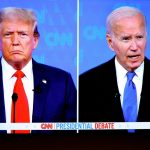Michael Macagnone | (TNS) CQ-Roll Call
WASHINGTON — The Supreme Court on Friday denied Steve Bannon’s request to stay out of prison while the ally of former President Donald Trump appeals two convictions for contempt of Congress.
The Supreme Court’s brief order means Bannon will have to report to prison for his four-month sentence by Monday.
Bannon had argued that the justices would eventually overturn his convictions for ignoring a subpoena from the House select panel investigating the Jan. 6, 2021, attack on the Capitol. He urged them to let him remain out of prison until they do so.
Earlier this year, the Supreme Court rejected a similar request to remain out of prison pending an appeal from former Trump trade adviser Peter Navarro, who is currently serving a similar prison term for his two contempt of Congress convictions.
Navarro also did not comply with a subpoena from the House select panel and was convicted at trial. Both Bannon and Navarro have said they intend to fight their convictions to the Supreme Court.
The brief order Friday did not explain the court’s reasoning for denying the request from Bannon, and it likely moves action in the appeal back to the U.S. Court of Appeals for the District of Columbia Circuit.
House Republican leadership on Wednesday announced plans to file a brief supporting Bannon’s next appeal.
In a statement, House Speaker Mike Johnson, Majority Leader Steve Scalise and Majority Whip Tom Emmer claimed that former Speaker Nancy Pelosi “abused” her power in setting up the House select panel in 2021.
The group said they intended to argue that the panel had been improperly appointed, an argument that Bannon and others have unsuccessfully made in court.
The last-minute fight over reporting to prison has previewed Bannon’s appeal of a rare contempt of Congress conviction, as his was one of only two in more than two decades.
Bannon’s attorneys have argued that he relied on advice from his attorney that the subpoena sought information protected by executive privilege and he did not have to respond.
The Justice Department, in a Wednesday filing at the Supreme Court, pointed out that Bannon had multiple opportunities to comply with the subpoena and should not be able to rely on his claims that his attorney advised him not to cooperate.
The DOJ filing, by Solicitor General Elizabeth Prelogar, argued that allowing Bannon to duck contempt charges by relying on his attorney’s advice would poke a hole in congressional power.
The “point is that permitting such a defense would undermine the statute’s function of supporting Congress’s ability to investigate, which is essential to its constitutional authority to legislate,” the Justice Department brief said.
In 2022, a federal jury convicted Bannon on two counts of contempt of Congress for defying subpoenas from the House select Jan. 6 panel seeking testimony and documents related to the attack.
District Judge Carl Nichols of the District of Columbia rejected ahead of trial Bannon’s attorneys’ argument that he was advised not to cooperate because of Trump’s executive privilege.
Following the conviction, Nichols sentenced Bannon to a four-month prison term but allowed him to remain free pending his appeal.
In the ruling last month, a three-judge panel of the D.C. Circuit found that there was no executive privilege involved in the subpoena, and even if there was Bannon would have had to at least respond to the subpoena.
After that ruling, Nichols ordered Bannon to report to prison for his sentence by July 1. Bannon’s attorneys then launched a last-minute plea to the D.C. Circuit, which ruled 2-1 to reject his effort to stay free pending a Supreme Court appeal.
___
©2024 CQ-Roll Call, Inc., All Rights Reserved. Visit cqrollcall.com. Distributed by Tribune Content Agency, LLC.


